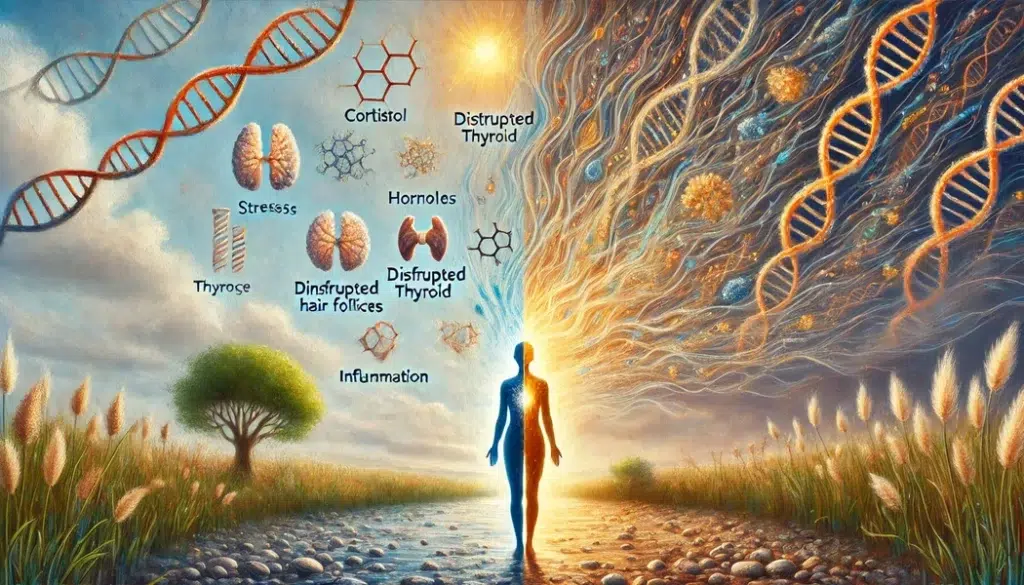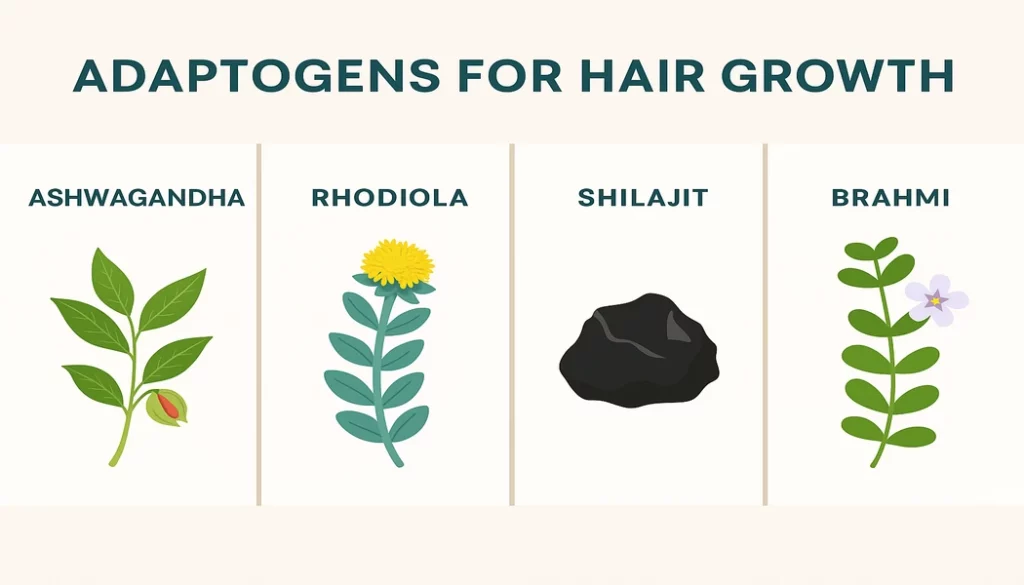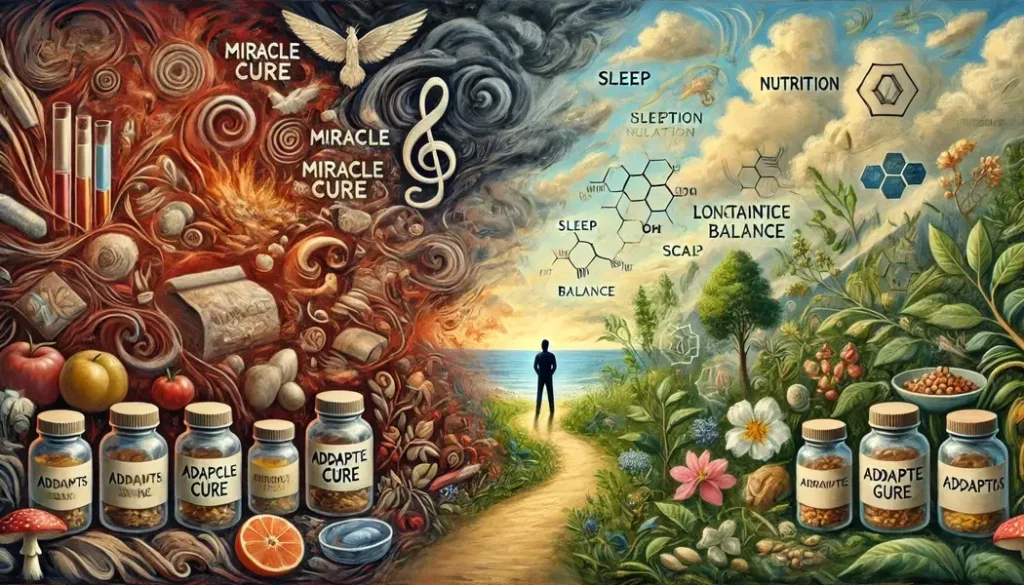🟩 🌿 What Are Adaptogens (and Why Should You Care?)
Most people don’t lose their hair because they chose the wrong shampoo. Often, the problem goes much deeper—into the body’s hormonal and stress-response systems. That’s where adaptogens come in. 🌿
Adaptogens are a unique class of herbal compounds that help the body adapt to physical, mental, and emotional stress. Instead of directly sedating you like a tranquilizer or boosting you like caffeine, they work more subtly—balancing what’s out of balance. This includes stress hormones like cortisol, inflammatory responses, and even energy metabolism.

The term “adaptogen” was coined in the 1940s by Russian scientists studying herbs that helped soldiers and pilots maintain peak performance under extreme pressure. Since then, adaptogens have been studied for their effects on everything from brain fog to burnout—but recently, they’ve gained attention for their impact on hair health.
Why? Because stress isn’t just something you feel—it’s something your hair follicles feel, too.
🟨 🧠 The Science: Stress, Hormones, and Hair Follicles
Let’s be clear: not all hair loss comes from stress—but chronic stress can absolutely accelerate it, especially in people who are already vulnerable due to genetics, hormonal shifts, or lifestyle triggers. 🧬
When you’re stressed, your body produces more cortisol, the primary stress hormone. Elevated cortisol levels interfere with the natural hair growth cycle by shortening the anagen (growth) phase and pushing more follicles into the telogen (resting) phase. This is often referred to as telogen effluvium, and it’s one of the most common forms of stress-induced hair loss.
But that’s not all. Stress also:
- Disrupts thyroid hormone production, affecting the scalp’s metabolism
- Triggers inflammation around the follicle
- Impairs scalp microcirculation, limiting oxygen and nutrient delivery
- Reduces collagen synthesis, weakening the scalp’s structural integrity
Over time, these effects don’t just cause shedding—they create an unfriendly environment for regrowth.

💡 That’s why managing stress from within—rather than just treating the surface—is one of the smartest things you can do for your hair.
🧪 Adaptogens That Support Hair Growth (Backed by Nature)
Hair loss triggered by stress isn’t just a theory—it’s a well-documented biological process. That’s why adaptogens, with their proven ability to modulate stress and support hormonal balance, have become key players in holistic hair health. 🧪
But let’s be clear—not all adaptogens are created equal. Some have direct benefits for the scalp and follicles, while others act indirectly by improving the internal conditions needed for healthy hair growth.
Here are the top adaptogens with the most scientific and practical support—and yes, they’re already included in supplements and treatments we recommend.
🌿 Rhodiola Rosea
Rhodiola is one of the most extensively studied adaptogens for lowering cortisol and enhancing stress resilience. Clinical studies—such as this one published on PubMed—demonstrate its ability to modulate the stress response by regulating the HPA axis. By reducing systemic stress, Rhodiola may help prevent stress-related telogen effluvium and support more stable hormonal cycles.
🌿 Ashwagandha (Withania somnifera)
Ashwagandha is widely recognized for its role in regulating the hypothalamic-pituitary-adrenal (HPA) axis—the body’s central stress-response system. Studies have shown it can help reduce cortisol levels, balance thyroid hormones, and reduce systemic inflammation. According to clinical research published in Cureus, consistent use of Ashwagandha improves stress tolerance and sleep quality, both of which are crucial for hormonal balance and hair health. This makes it particularly beneficial for individuals experiencing hair loss related to chronic fatigue or endocrine disruption.
💡 Available in multi-adaptogen formulas for daily stress control.
🌿 Panax Ginseng
Panax Ginseng doesn’t just fight fatigue—it plays a direct role in supporting hair growth. Multiple studies suggest that ginsenosides (its active compounds) promote the proliferation of dermal papilla cells, which are essential for initiating the anagen phase of the hair cycle. One study published in the Journal of Ginseng Research (source) found that ginseng extract stimulated hair growth by activating key pathways like Wnt/β-catenin signaling. It also improves scalp microcirculation, helping deliver nutrients and oxygen to hair follicles more efficiently.
🌬️ That’s why it’s often used in DHT-blocking conditioners and follicle-activating serums aimed at reversing thinning hair.
🌿 Angelica sinensis (Dong Quai)
Often referred to as the “female ginseng,” Angelica sinensis is a traditional Chinese herb known for regulating estrogen levels and improving peripheral blood circulation. Research published in Phytotherapy Research (source) suggests that Dong Quai may exhibit mild phytoestrogenic effects, making it especially helpful for women experiencing hormonally driven hair thinning, such as during perimenopause.
🌸 Because of its vascular and hormonal properties, Dong Quai is commonly used in topical formulas that address hormonal hair loss and enhance scalp nourishment.
🌿 Licorice Root (Glycyrrhiza Uralensis)
Licorice root contains bioactive compounds like glycyrrhizin, known to reduce inflammation, soothe irritated skin, and modulate cortisol levels. A study in the Journal of Investigative Dermatology (source) supports its anti-inflammatory effects on skin cells, which can be beneficial for stress-induced scalp issues like itching, redness, or flaking.
🧴 It’s commonly found in scalp serums and conditioners that aim to calm inflammation and restore the scalp’s protective barrier, especially in cases of chronic stress or sensitivity.
🌿 Eleuthero (Siberian Ginseng)
Eleuthero (Eleutherococcus senticosus) is classified as an adaptogen that helps the body resist various stressors—physical, environmental, and emotional. Research suggests it supports adrenal function and improves resilience to fatigue by modulating the hypothalamic-pituitary-adrenal (HPA) axis (source).
⚙️ While its effects on hair are more indirect, it plays a crucial role in lowering systemic inflammation and stabilizing stress responses. That makes it a valuable ingredient in full-spectrum adaptogen formulas that aim to improve overall stress tolerance—an essential factor in managing hair loss triggered by chronic stress.
🌿 Bacopa Monnieri
Bacopa Monnieri is a neuroprotective herb traditionally used in Ayurvedic medicine to enhance memory and cognitive clarity. But its adaptogenic effects go deeper—helping regulate the body’s stress response by modulating cortisol levels and supporting the HPA axis (source).
🌙 In the context of hair health, Bacopa indirectly contributes by improving sleep quality, lowering oxidative stress, and calming mental agitation. These effects create a more favorable internal environment for follicle recovery and hormonal balance. It’s commonly included in nighttime stress-relief blends or adaptogenic stacks targeting long-term resilience.

💬 Pro tip: Some of the most effective formulas combine several of these adaptogens into one capsule—often alongside biotin, B-complex vitamins, or marine collagen. This synergy can amplify results and make daily compliance easier.
⚠️ What to Avoid: Adaptogen Myths and Misconceptions
With the growing popularity of adaptogens, it’s no surprise that marketing hype often outruns scientific reality. 🌪️ While these herbs can be powerful tools, relying on them as a magic bullet for hair growth is a mistake.
Here’s what you need to keep in mind:
❌ Not All “Adaptogen” Labels Are Backed by Science
Just because a product says adaptogenic doesn’t mean it contains proven ingredients. Some trendy blends use buzzwords but lack meaningful dosages or effective compounds. Always check the ingredient list and research the actual plant extracts used.
❌ No Single Ingredient Will Fix Everything
Hair loss is a multi-layered issue—involving genetics, hormones, inflammation, and stress. Adaptogens are most effective when combined with other strategies, like sleep hygiene, nutritional support, and proper scalp care. 🧴🥗💤

❌ Don’t Ignore Interactions
Certain adaptogens can affect thyroid function, blood pressure, or interact with medications. That’s why it’s essential to start with a proven blend or consult your doctor if you’re dealing with chronic conditions.
💡 Real Hair Recovery = Long Game
If a product promises overnight regrowth, it’s probably too good to be true. Think of adaptogens as long-term allies—not miracle cures. Their strength lies in helping the body stay in balance, so the conditions for hair growth can thrive naturally.
📎 For a broader strategy, check out our guide on Holistic Approaches to Hair Health
✅ Combining Adaptogens With Other Hair-Healthy Strategies
Adaptogens are powerful—but they work best when they’re part of a bigger strategy. Think of them as the foundation of your inner defense system. But to truly support hair regrowth, you need to address other factors that influence the follicle environment. 🧩
Here’s how to get the most out of your adaptogen regimen:
🥗 Eat Nutrient-Dense, Anti-Inflammatory Foods
Your follicles need fuel. A diet rich in omega-3s, antioxidants, iron, and zinc helps reduce systemic inflammation and gives your scalp the nutrients it needs to thrive. Think: fatty fish, leafy greens, nuts, seeds, and berries.
😴 Prioritize Sleep and Recovery
Cortisol levels rise with poor sleep and chronic fatigue. Aim for at least 7 hours of restorative sleep per night to allow your body—and your scalp—to reset. Adaptogens like ashwagandha and Bacopa support deeper sleep cycles when used regularly.
🧴 Support the Outside: Use Adaptogen–Enhanced Products
Your internal routine should be matched by external care. Look for conditioners and scalp serums that include ingredients like ginseng, ginger, and licorice root—all of which support microcirculation and soothe irritation.
💡 Some formulas even combine DHT blockers and adaptogens for dual-action support.

💊 Choose Synergistic Supplements
The best results often come from multi-ingredient formulas that combine adaptogens with key nutrients like:
- Biotin
- B-complex vitamins
- Magnesium
- Collagen
- Saw palmetto or pumpkin seed oil (for DHT modulation)
These formulations are designed to target the stress-hormone axis while feeding your follicles from the inside out.
📎 We’ve covered proven options in our posts on stress supplements and hair-support formulas.
💬 Final Tip: Routine > Random
Taking one capsule or using one shampoo won’t cut it. The key is consistency—a daily routine that integrates adaptogens, sleep hygiene, scalp care, and nutrition. That’s how you go from losing hair to building real, visible change. 💪
Hair loss can feel overwhelming, especially when it’s tied to stress. But the good news is—your body knows how to heal. You just need to give it the right tools.
Adaptogens aren’t quick fixes. They’re long-term allies, helping your body stay in balance so your follicles can thrive in a more stable, less inflamed environment. When combined with the right supplements, hair-friendly foods, quality sleep, and proper scalp care, they can shift the tide from loss to regrowth.
You don’t need to do everything overnight. Just start by supporting your system from within—and trust the process.
🧘♀️ New Research (2025)
A newly published study in Nature Mental Health reveals that just 6 weeks of consistent meditation and mindfulness practice can help rebalance the HPA axis—your body’s stress-response command center.
Lower cortisol, stronger emotional recovery, and yes… better support for your hair follicles.
👉 This research perfectly aligns with the adaptogen-based strategies discussed above.
Want healthier, stronger hair? Discover 8 science-backed habits that protect your scalp and boost natural growth. Get your free PDF guide today!

❓ FAQ
🤯 Can stress really cause hair loss—and can adaptogens help?
Yes, chronic stress can trigger a condition called telogen effluvium, where more hairs than usual enter the resting phase and eventually fall out. Stress also disrupts hormones, circulation, and inflammation levels—all of which affect follicles.
Adaptogens like Rhodiola and Ashwagandha help your body regulate the stress response, creating a more stable environment for hair growth.
🌿 Which adaptogen is best for hair growth in men?
Panax ginseng is one of the best for direct follicle stimulation, while Ashwagandha is ideal for managing stress-induced hormonal shifts. Rhodiola is also excellent for balancing cortisol and boosting resilience. The best results often come from combinations rather than single extracts.
⏳ How long does it take to see results with adaptogens?
Most people notice subtle changes in stress resilience and sleep within 2–3 weeks. Hair regrowth takes longer—usually 8–12 weeks, depending on severity and consistency.
Remember: adaptogens work gradually. Stick to your routine and give your body time to respond.
❓ Can adaptogens cause side effects?
Yes. While most adaptogens are well-tolerated, some can cause side effects—especially in high doses or with long-term use. For example, licorice root may raise blood pressure, and ginseng can cause insomnia or headaches in sensitive individuals. Always start with a low dose and monitor how your body responds.
❓ Are adaptogens safe to use with thyroid medication?
Some adaptogens, like ashwagandha, may affect thyroid hormone levels. While this can be beneficial for some, it might interfere with thyroid medication if not monitored properly. Always talk to your doctor or healthcare provider before combining adaptogens with any prescribed treatment.


Leave a Reply